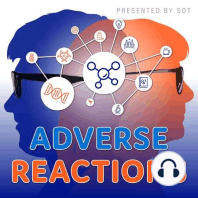27 min listen

All the Tox That's Fit to Print . . . or Present . . . or Blog
All the Tox That's Fit to Print . . . or Present . . . or Blog
ratings:
Length:
19 minutes
Released:
May 27, 2021
Format:
Podcast episode
Description
With pre-print services, data sharing, open access, and the internet rapidly changing the journal publication landscape, Toxicological Sciences Editor-in-Chief Jeffrey M. Peters provides co-hosts Anne Chappelle and David Faulkner with perspective on how journals are adapting to the times. Dr. Peters also details how new training and guidance programs at ToxSci are aiming to enhance submissions and peer reviews. About the GuestJeffrey M. Peters, PhD, is a Distinguished Professor of molecular toxicology and carcinogenesis in the College of Agricultural Sciences and the Huck Institutes of the Life Sciences at the Pennsylvania State University (Penn State). He also serves as Deputy Director of the Penn State Cancer Institute, where his role is to catalyze collaborations among cancer researchers across Penn State’s colleges and campuses.Dr. Peters has served on many editorial boards, including that of the Journal of Biological Chemistry, and he is the Editor-in-Chief of Toxicological Sciences, the official journal of the Society of Toxicology (SOT).Dr. Peters joined Penn State in 2000 after completing a postdoctoral fellowship at the National Cancer Institute (NCI) in Bethesda, Maryland. He holds a bachelor’s degree in dietetics and a doctorate in nutrition science, both from the University of California Davis. Dr. Peters also completed postdoctoral fellowships in the Department of Cell Biology and Human Anatomy and the Institute of Toxicology and Environmental Health at UC-Davis.Dr. Peters holds long-standing NCI funding for his research program related to cancer and lipid metabolism. His laboratory studies the role of the peroxisome proliferator-activated receptors (PPARs) in the regulation of homeostasis, toxicology, and carcinogenesis. PPARs are members of the nuclear receptor superfamily and are critical modulators of environmental and dietary stimuli. The lab is particularly interested in delineating how natural compounds found in dietary constituents can activate PPARs, with the goal of identifying new molecules/proteins that can be targeted with existing approaches to improve the efficacy of chemoprevention and chemotherapy. These studies will likely lead to the identification of specific macronutrients that will effectively activate PPARs so that dietary formulations of agricultural products can be developed that will improve human and animal health and prevent serious diseases.Dr. Peters also is the Associate Director of the Center for Molecular Toxicology and Carcinogenesis at Penn State and was previously the co-leader of the Cancer Institute’s Mechanisms of Carcinogenesis research program. DisclaimerThe viewpoints and information presented in Adverse Reactions represent those of the participating individuals. Although the Society of Toxicology holds the copyright to the production, it does not vet or review the information presented, nor does presenting and distributing the Adverse Reactions podcast represent any proposal or endorsement of any position by the Society.
Released:
May 27, 2021
Format:
Podcast episode
Titles in the series (23)
The United States of Toxicity by Adverse Reactions